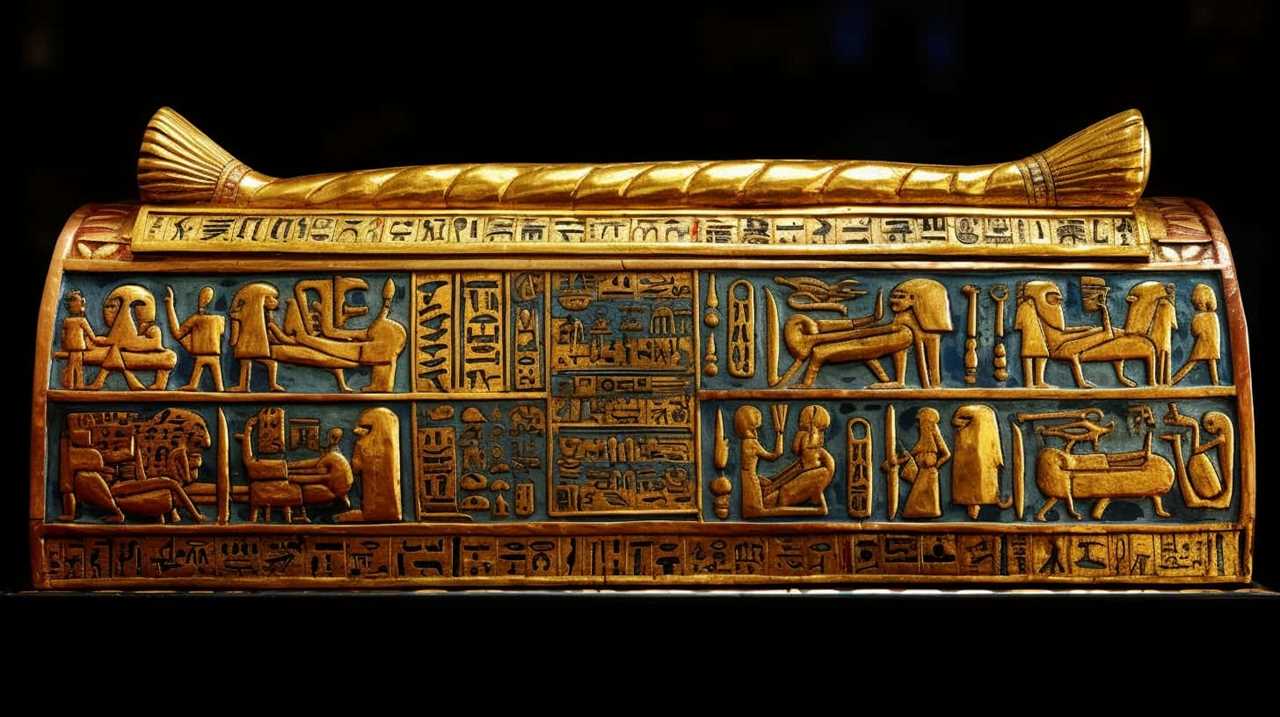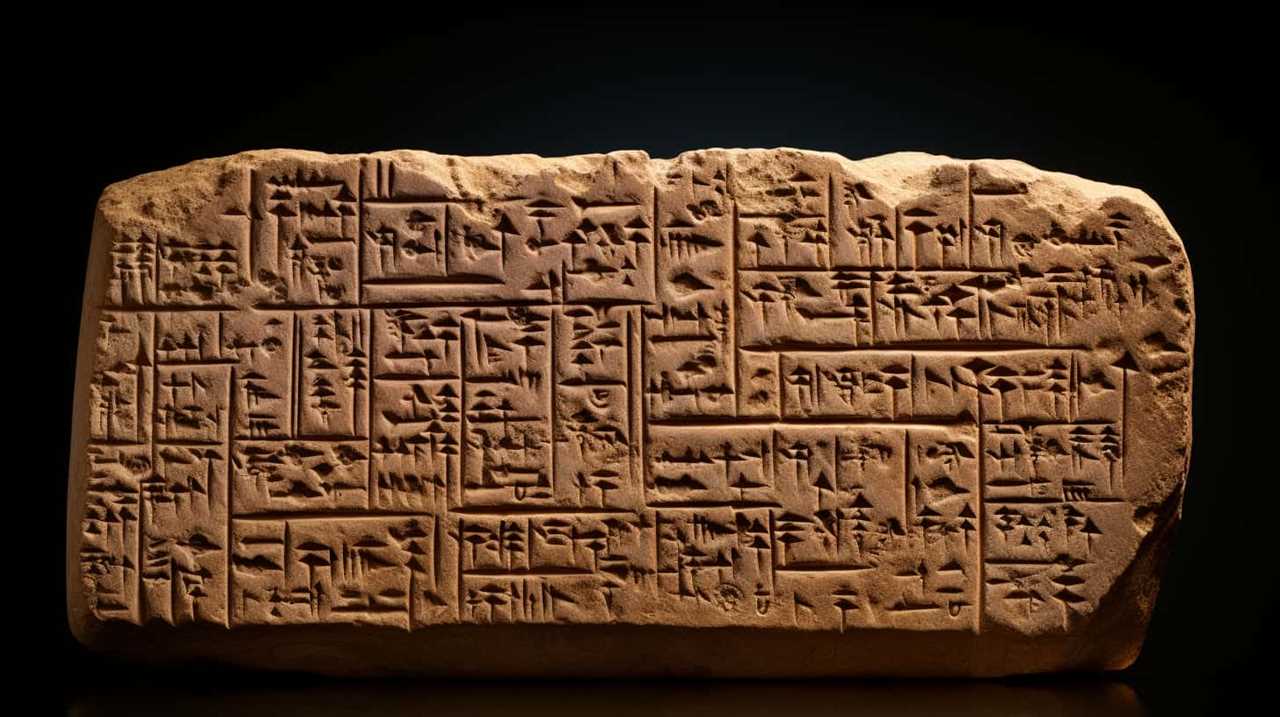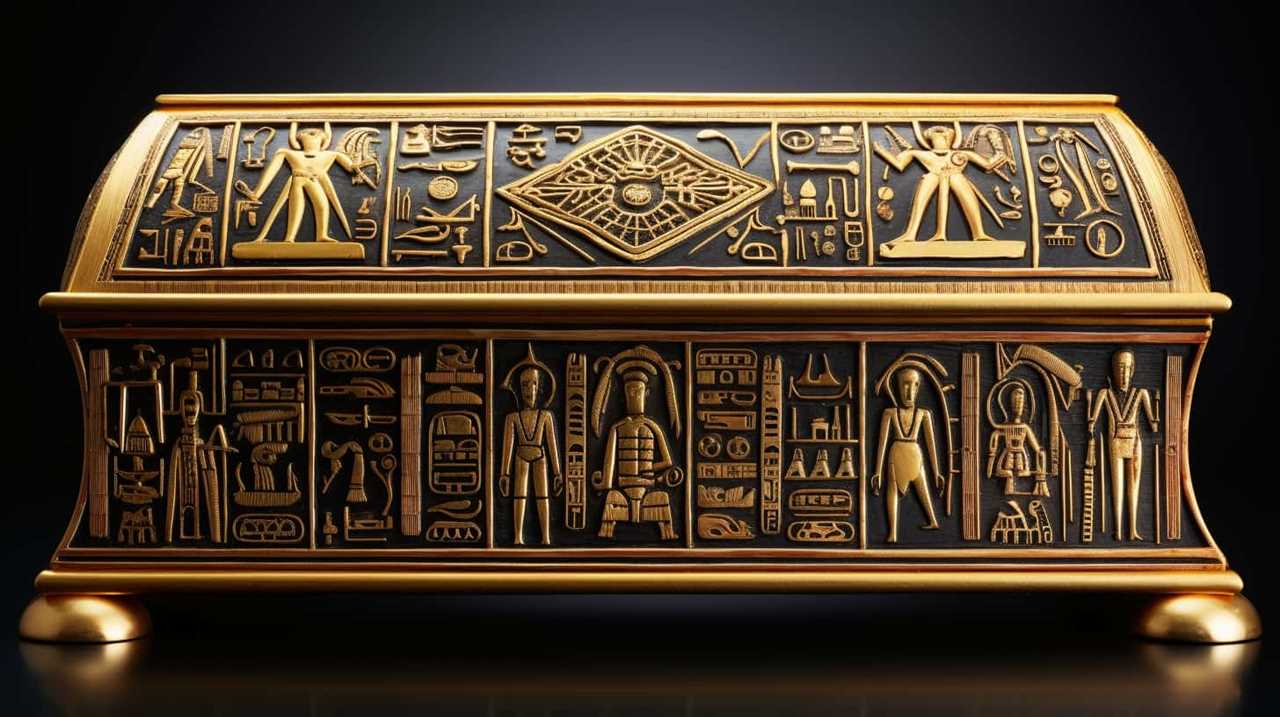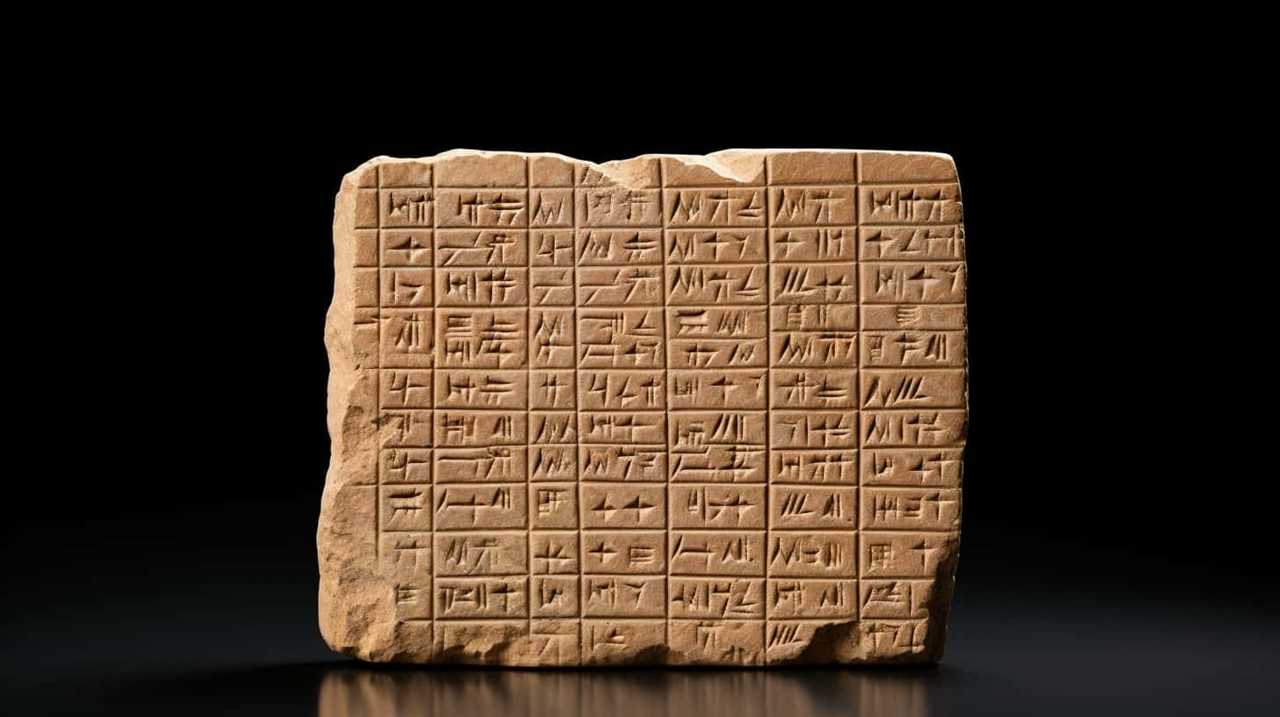Welcome to ‘Deciphering Confucianism: Classic Sayings Unveiled,’ where we welcome you to embark on a journey of enlightenment through the timeless wisdom of Confucianism.
In this guide, we delve deep into the profound teachings of Confucius and his disciples, uncovering the hidden meanings behind their enigmatic sayings.
Prepare to unlock the secrets of filial piety, unravel the intricacies of human relationships, and explore the transformative power of self-cultivation.
Through our exploration of the Analects and other classic texts, we will unravel the tapestry of Confucian values and their relevance in modern society.

So join us in this quest for mastery, as we navigate the intricate paths of Confucian philosophy and discover the timeless truths that continue to shape our world today.
Key Takeaways
- Filial piety is a cornerstone of Confucian ethics, emphasizing respectful behavior towards parents and ancestors.
- Mutual respect and open communication are crucial in cultivating harmony in human relationships.
- Cultivating virtue and moral character is central to Confucianism and contributes to personal and societal harmony.
- The family is considered the fundamental unit of society in Confucianism, and practicing filial piety is key to maintaining harmonious family relationships.
The Importance of Filial Piety
Filial piety holds immense significance in Confucianism as it emphasizes the dutiful and respectful behavior towards one’s parents and ancestors. It’s a cornerstone of Confucian ethics, highlighting the importance of family bonds and the role of ancestors in shaping an individual’s moral character. In Confucian teachings, filial piety isn’t merely a matter of fulfilling one’s obligations towards parents, but it also extends to honoring and revering one’s ancestors.
Confucius believed that filial piety is the foundation of a harmonious society. By observing filial piety, individuals cultivate virtues such as respect, loyalty, and gratitude, which are essential for maintaining strong family bonds and social cohesion. The role of ancestors in Confucianism is crucial, as they’re seen as guiding and protecting their descendants. By honoring and remembering them, individuals show gratitude for the sacrifices made by previous generations and acknowledge the debt they owe to their ancestors.
Family is considered the fundamental unit of society in Confucianism, and filial piety is seen as the key to maintaining harmonious relationships within the family. It’s believed that by practicing filial piety, individuals not only contribute to the well-being of their family but also set an example for others to follow. Therefore, the importance of filial piety can’t be overstated in Confucianism, as it fosters the values necessary for a thriving and morally upright society.

Harmony in Human Relationships
When exploring the concept of harmony in human relationships within the context of Confucianism, several key points emerge.
One such point is the importance of mutual respect in relationships, where all parties involved treat each other with dignity and honor.
Additionally, Confucianism emphasizes the need to balance individual needs with the needs of the collective, recognizing that harmonious relationships require compromising and considering the greater good.
Mutual Respect in Relationships
We frequently prioritize mutual respect in our relationships for the purpose of cultivating harmony and understanding between individuals. Building trust and developing strong communication skills are essential components of fostering mutual respect. Trust forms the foundation of any healthy relationship, allowing individuals to feel secure and supported. Open and effective communication, on the other hand, enables individuals to express their thoughts, feelings, and needs, promoting understanding and empathy. By employing active listening, assertiveness, and empathy, we can establish an environment of respect where all parties feel heard and valued. Mutual respect in relationships is not only crucial for maintaining harmony, but it also fosters a sense of unity and cooperation. It encourages individuals to embrace diversity, embrace different perspectives, and work towards common goals.

| Building Trust | Communication Skills |
|---|---|
| – Honesty and transparency | – Active listening |
| – Reliability and consistency | – Assertiveness |
| – Respect for boundaries | – Empathy |
| – Accountability for actions | – Clarity and conciseness |
Balancing Individual and Collective Needs
To achieve harmony in human relationships, it’s essential to strike a balance between individual and collective needs. Confucianism emphasizes the importance of both individual fulfillment and community welfare, advocating for a harmonious coexistence between the two. This balance is critical to maintaining social cohesion and ensuring the well-being of both individuals and society as a whole.
Here are four key points to consider when seeking to strike a balance between individual and collective needs:
- Recognize the value of individual autonomy: It’s crucial to acknowledge and respect the individual’s rights and desires for personal fulfillment. Each person has their own unique aspirations and needs that should be taken into account.
- Emphasize the importance of community welfare: While individual fulfillment is important, it shouldn’t come at the expense of the welfare of the community. Society functions at its best when individuals work collectively towards common goals and contribute to the well-being of others.
- Foster mutual understanding and empathy: Building harmonious relationships requires understanding and empathy towards others. By putting ourselves in the shoes of others, we can better appreciate their perspectives and needs, leading to more balanced interactions.
- Encourage open communication and compromise: Effective communication is key to finding common ground between individual and collective needs. By fostering open dialogue and being willing to compromise, individuals can work towards solutions that benefit both themselves and the community.
Cultivating Virtue and Moral Character
When examining Confucianism, it becomes evident that moral virtues play a central role in this philosophical system.
The importance of cultivating one’s character is emphasized as a means to achieve harmony and balance in both personal and societal realms.

Confucius believed that virtue serves as the foundation for a well-functioning society, as individuals with virtuous character contribute positively to the overall moral fabric of their community.
Moral Virtues in Confucianism
In the study of Confucianism, cultivating virtue and moral character plays a crucial role in shaping our ethical framework. Confucian values have had a profound influence on Asian societies, particularly in the realms of education and societal norms. Here are four key aspects of moral virtues in Confucianism:
- Ren (仁): This virtue encompasses benevolence, compassion, and kindness towards others. It emphasizes the importance of treating others with respect and empathy.
- Li (禮): Li refers to the observance of proper etiquette and rituals. It emphasizes the importance of maintaining harmonious relationships and upholding social order.
- Xiao (孝): Xiao emphasizes filial piety, or the respect and care for one’s parents and ancestors. It stresses the significance of family values and obligations.
- Yi (義): Yi represents righteousness and moral integrity. It entails acting in accordance with ethical principles and fulfilling one’s duties and responsibilities.
By cultivating these virtues, individuals can contribute to a more harmonious and morally upright society.
Confucianism’s influence on Asian societies has been profound, and these moral virtues continue to shape their educational systems and societal values.

Importance of Character Cultivation
Cultivating virtue and moral character is essential for individuals in Confucianism, as it allows us to embody the values of Ren, Li, Xiao, and Yi, thereby contributing to a harmonious and morally upright society.
Character development serves as the foundation of Confucianism, emphasizing the importance of personal growth and self-cultivation. In Confucian thought, character is seen as something that can be nurtured and developed through continuous effort and self-reflection.
Through the cultivation of virtue and moral character, individuals strive to become exemplary role models for others, inspiring them to also pursue personal growth and moral excellence. This emphasis on character cultivation goes beyond mere adherence to societal norms and rules; it encourages individuals to develop a strong moral compass and to consistently act in accordance with virtuous principles.
Virtue as Societal Foundation
As we delve deeper into the importance of character cultivation, it becomes evident that virtue serves as the foundational pillar for the development of a harmonious and morally upright society in Confucianism. In this philosophy, virtue isn’t only a personal attribute but also a collective responsibility that contributes to societal progress. Here are four key aspects that highlight the significance of virtue in shaping relationships and fostering moral values within a community:

- Respect for Others: Virtue emphasizes the importance of respecting others, treating them with kindness and dignity. This fosters harmonious relationships and creates a sense of unity within society.
- Filial Piety: Confucianism places great emphasis on filial piety, the virtue of honoring and respecting one’s parents and ancestors. This not only strengthens family bonds but also promotes a stable and respectful social structure.
- Trustworthiness and Integrity: Virtuous individuals strive to be honest, trustworthy, and maintain integrity in their actions. This builds trust among individuals and contributes to a morally upright society.
- Reciprocity: Confucianism emphasizes the concept of reciprocity, where individuals should treat others as they’d like to be treated. This fosters empathy, fairness, and mutual respect within relationships.
Understanding the role of virtue as the foundation of a morally upright society is crucial in Confucianism. It highlights the importance of cultivating virtuous qualities in individuals to create a harmonious and prosperous community.
Transitioning into the subsequent section about ‘education as a path to wisdom’, it’s through the process of education that individuals can acquire the knowledge and wisdom necessary to cultivate virtue and contribute to the betterment of society.
Education as a Path to Wisdom
Education plays a vital role in our journey towards wisdom. In Confucianism, education is seen as a means of attaining enlightenment and self-improvement. It’s through education that we acquire knowledge and develop the skills necessary to cultivate ourselves and contribute to society. Confucius believed that education wasn’t merely about acquiring information, but about the transformation of the individual.
In Confucian thought, education isn’t limited to the classroom. It’s a lifelong process that encompasses both formal and informal learning experiences. The goal of education isn’t just to gain knowledge, but to develop moral character and cultivate virtues such as benevolence, righteousness, and propriety. Through education, we learn to understand and appreciate the interconnectedness of all things, and to live in harmony with others and with nature.

Education also empowers individuals to critically analyze and question the world around them. It encourages independent thinking and fosters creativity. By continuously seeking knowledge and challenging existing ideas, we expand our understanding and contribute to the progress of society.
The Power of Self-Cultivation
Continuing on our journey towards wisdom, we recognize the transformative power of self-cultivation in Confucianism. In this philosophy, the act of self-reflection is seen as a powerful tool for personal growth and inner transformation. Through disciplined self-reflection, individuals are able to understand their own thoughts, emotions, and actions, leading to greater self-awareness and the ability to make positive changes in their lives.
Key points to consider when exploring the power of self-cultivation in Confucianism:
- Self-reflection: Confucian teachings emphasize the importance of regularly reflecting upon one’s actions and thoughts. By engaging in self-reflection, individuals gain insight into their own strengths, weaknesses, and areas for improvement.
- Inner transformation: Self-cultivation in Confucianism goes beyond surface-level changes. It aims at transforming one’s inner character and moral qualities, enabling individuals to become virtuous and ethically upright.
- Self-discipline: Self-cultivation requires discipline and self-control. It involves the practice of restraining one’s desires and impulses, and instead, cultivating virtues such as benevolence, righteousness, and propriety.
- Personal growth: Through self-cultivation, individuals can continuously strive for personal growth and self-improvement. This process is seen as an ongoing journey towards becoming a better person and contributing positively to society.
The power of self-cultivation in Confucianism lays the foundation for the subsequent exploration of the role of rituals and etiquette. By cultivating one’s inner character, individuals are better equipped to engage in meaningful rituals and uphold proper etiquette in their interactions with others.

Transitioning into the next section: Now that we’ve understood the power of self-cultivation, let’s delve into the significance of rituals and etiquette in Confucianism.
The Role of Rituals and Etiquette
After recognizing the transformative power of self-cultivation, we now delve into the role of rituals and etiquette in Confucianism. In Confucian thought, ceremonies play a pivotal role in shaping an individual’s character and cultivating harmony within society. The role of ceremonies is two-fold: they serve as a means of expressing respect and reverence towards others while also reinforcing social hierarchy and order. Through participating in rituals, individuals are encouraged to develop a sense of propriety and to adhere to socially accepted norms of behavior.
Confucius believed that manners and etiquette were essential in fostering harmonious relationships among individuals. Manners, in Confucianism, encompass a wide range of behaviors, including how one speaks, dresses, and conducts oneself in various social contexts. By adhering to proper manners, individuals not only demonstrate respect for others but also contribute to the overall well-being of society.
Furthermore, rituals and etiquette are seen as instrumental in cultivating moral character. By engaging in prescribed rituals and displaying proper etiquette, individuals are guided towards the development of virtues such as humility, sincerity, and filial piety. These virtues, in turn, contribute to the maintenance of social order and the promotion of a harmonious society.

The Pursuit of Social Harmony
By cultivating harmonious relationships and promoting moral character through ceremonies and etiquette, we actively pursue social harmony in Confucianism. In this pursuit, the role of community plays a crucial part, as it’s within the community that individuals learn and internalize social norms. These norms, in turn, have a profound impact on shaping the behavior and interactions of individuals within society.
To further understand the pursuit of social harmony in Confucianism, it’s important to consider the following:
- Mutual Respect: Confucianism emphasizes the importance of mutual respect among individuals. By treating others with respect, we create a harmonious atmosphere where everyone feels valued and appreciated.
- Reciprocity: Another key aspect of social harmony in Confucianism is the principle of reciprocity. This means that individuals should treat others as they’d like to be treated themselves. By practicing reciprocity, we establish a sense of fairness and equality within the community.
- Collective Responsibility: Confucianism places great emphasis on the idea of collective responsibility. Individuals are encouraged to take responsibility for the well-being of the community as a whole, rather than solely focusing on their individual interests. This fosters a sense of unity and cooperation within society.
- Harmonious Relationships: Confucianism places a strong emphasis on the cultivation of harmonious relationships, particularly within the family and between individuals of different social statuses. By nurturing these relationships, we contribute to the overall harmony and stability of society.
The Doctrine of the Mean
In our exploration of Confucianism, let us now delve into the profound concept known as the Doctrine of the Mean. This principle, also referred to as the golden mean, is a fundamental tenet of Confucian ethics that emphasizes the importance of moral equilibrium. It advocates for moderation and balance in all aspects of life, guiding individuals to avoid extremes and find harmony in their actions and behaviors.
The Doctrine of the Mean can be understood as a guiding principle for ethical behavior, highlighting the need to strike a balance between two extremes. To illustrate this concept, let us consider a table that captures the essence of the golden mean:

| Extreme | Golden Mean | Extreme |
|---|---|---|
| Excess | Moral | Deficiency |
| Equilibrium |
The left column represents the extreme of excess, where individuals indulge in excessive behavior or go to extremes without considering the consequences. On the right column, we have the extreme of deficiency, where individuals lack certain virtues or fail to fulfill their moral obligations. In the middle column, we find the golden mean, which represents the moral equilibrium that one should strive for.
The Way of the Gentleman
When exploring the concept of the Way of the Gentleman in Confucianism, it’s crucial to examine the virtues that define this ideal. The virtues of a Gentleman encompass traits such as benevolence, righteousness, propriety, wisdom, and trustworthiness.
Living with integrity is another essential aspect of the Way of the Gentleman, as it involves aligning one’s actions with moral principles and exhibiting honesty and sincerity in all interactions.
Furthermore, cultivating moral character is a fundamental practice in Confucianism, emphasizing the continuous self-improvement and development of one’s ethical values.

Virtues of a Gentleman
We embrace the virtues of a gentleman, embodying the principles of The Way of the Gentleman. The Confucian virtues guide our moral conduct, shaping us to become exemplary individuals in society. These virtues aren’t merely abstract concepts, but practical guidelines that enable us to navigate the complexities of human relationships and cultivate our character.
Ren (仁): Benevolence and compassion towards others, treating them with kindness and empathy. Yi (义): Righteousness and integrity, upholding moral principles and acting with justice and fairness. Li (礼): Propriety and etiquette, adhering to social norms and displaying respect for others. Xin (信): Sincerity and trustworthiness, being honest in our words and actions, and keeping our promises.
Living With Integrity
Our commitment to living with integrity as gentlemen is evident in our consistent adherence to moral principles and the embodiment of sincerity, trustworthiness, righteousness, and propriety.
As gentlemen, we recognize the importance of personal values and strive to align our actions with these values in all aspects of our lives. We understand that ethical decision making requires careful consideration of the consequences of our actions, both for ourselves and for others.

By prioritizing integrity, we ensure that our actions are guided not only by societal norms but also by our own moral compass. This commitment to living with integrity allows us to navigate complex situations with clarity and to make choices that are true to our principles.
It’s through this unwavering dedication to moral values that we cultivate moral character and become exemplary individuals in society.
Cultivating Moral Character
As we delve into the topic of cultivating moral character (The Way of the Gentleman), it’s important to understand the significance of embodying the principles of Confucianism in our daily lives.
Character development and moral education are central to Confucian teachings, emphasizing the cultivation of virtues such as benevolence, righteousness, propriety, wisdom, and trustworthiness. By focusing on personal growth and self-improvement, Confucianism encourages individuals to strive for moral excellence and develop a strong moral character.

This involves not only acquiring knowledge but also putting it into practice, integrating ethics into our thoughts, words, and actions. Through continuous self-reflection, moral education, and ethical behavior, one can gradually shape their character and contribute to the betterment of society.
Embracing Confucian values and principles allows us to become true gentlemen, exemplifying virtue and embodying the ideals of Confucianism.
Wisdom From the Analects
Throughout the Analects, Confucius imparts profound wisdom that guides us on the path towards moral development and harmonious living. His teachings provide a wealth of knowledge and insights that require careful exploration and interpretation.
One of the key aspects of wisdom in the Analects is the emphasis on self-cultivation. Confucius believed that true wisdom comes from constantly refining one’s character and conducting oneself in an ethical manner. He stresses the importance of self-reflection and the pursuit of virtuous qualities such as benevolence, righteousness, and filial piety. By cultivating these virtues, individuals can contribute to a harmonious society and establish strong moral foundations.

Another source of wisdom in the Analects lies in the concept of hierarchical relationships. Confucius believed in the importance of maintaining proper social order and harmony through the observance of respect and obedience towards superiors, as well as showing kindness and benevolence towards subordinates. This hierarchical structure is seen not as a means of oppression, but rather as a framework for creating a balanced and harmonious society.
Interpreting the Analects requires careful analysis of the context in which Confucius’s teachings were recorded. Understanding the historical and cultural background is crucial in order to fully grasp the depth and significance of his words. Additionally, interpreting the Analects necessitates a willingness to engage in critical thinking and reflection, as it’s through this process that we can extract the timeless wisdom encapsulated within these ancient texts.
The Art of Governance
In the Analects, Confucius imparts wisdom on the art of governance, emphasizing the importance of maintaining proper social order and harmony through respectful and benevolent leadership. The principles of leadership highlighted by Confucius provide valuable insights into effective governance and the responsibilities of leaders in society.
In understanding the art of governance according to Confucius, it’s essential to recognize the following principles:

- Moral Exemplification: Leaders must uphold high moral standards and serve as role models for their subordinates. They should embody virtues such as integrity, honesty, and compassion, inspiring others to follow their example.
- Respect for Ancestors: Confucius emphasizes the significance of honoring and respecting the wisdom of past leaders. By acknowledging the legacy of their predecessors, leaders can draw upon the wisdom of tradition and apply it to contemporary challenges.
- Cultivating Personal Virtues: Confucius believed that leaders should continuously work on developing their own character and virtues. By cultivating qualities such as humility, self-discipline, and wisdom, leaders can lead by personal example and inspire their followers to do the same.
- Harmony through Benevolence: Confucius highlights the importance of benevolent leadership in creating harmony within society. Leaders should prioritize the well-being and welfare of their subjects, fostering an environment of trust, cooperation, and mutual respect.
Ethics and Leadership
Let’s explore how ethics and leadership intertwine in Confucianism.
In Confucian philosophy, ethical decision making is considered an essential aspect of effective leadership. Confucius emphasized the importance of moral character and virtuous behavior in leaders, believing that they should serve as role models for their subordinates.
One key principle of Confucian ethics in leadership is the concept of ren, often translated as benevolence or humaneness. This virtue requires leaders to prioritize the well-being and development of their followers, treating them with kindness, compassion, and respect. By practicing ren, leaders can foster a harmonious and ethical work environment, where trust and cooperation thrive.
Confucianism also recognizes the importance of different leadership styles in various situations. The Analects, a collection of Confucius’ teachings, mentions that leaders should adapt their approach based on the needs of their subordinates. This flexibility allows leaders to make ethical decisions that consider the unique circumstances and individuals involved.

Moreover, Confucianism emphasizes the cultivation of personal virtues in leaders. Through self-discipline and self-cultivation, leaders can develop qualities such as integrity, humility, and wisdom. These virtues enable leaders to make ethical decisions that prioritize the collective good over personal gain.
Applying Confucian Values in Modern Society
As we delve into the application of Confucian values in modern society, we can see how the principles of ethics and leadership continue to play a crucial role. Applying Confucian values in the workplace is essential for maintaining a harmonious and productive work environment. Confucianism emphasizes the importance of relationship-building and respect for authority, which can contribute to a positive and cohesive workplace culture. Additionally, Confucian teachings promote the development of moral character and the cultivation of virtues such as integrity, loyalty, and filial piety. These values can guide individuals in making ethical decisions and behaving responsibly in their professional lives.
Confucianism also addresses the topic of gender roles in society. Traditionally, Confucian teachings have emphasized the hierarchical structure of society, with men occupying positions of authority and women occupying more submissive roles. However, as society evolves, there’s a growing recognition of the need for gender equality and the dismantling of gender stereotypes. Modern interpretations of Confucian values strive to promote gender equality by emphasizing the importance of education and personal development for both men and women.
Frequently Asked Questions
How Does Confucianism View the Concept of Wealth and Material Possessions?
In Confucianism, the perception of wealth and material possessions is shaped by a focus on moral values rather than materialistic pursuits. This philosophy emphasizes the importance of virtue, self-cultivation, and harmony within society.

What Is the Confucian Perspective on Gender Roles and Equality?
Confucianism and gender roles have long been intertwined, with women traditionally expected to embody virtues like obedience and humility. However, Confucianism also emphasizes equality in relationships, where mutual respect and harmony are key.
How Does Confucianism Address the Issue of Social Inequality and Class Distinctions?
Confucianism addresses social inequality and class distinctions through the principles of social mobility and meritocracy. These concepts emphasize the importance of individual effort and talent in determining one’s social status, promoting a fair and just society.
Can Confucianism Coexist With Other Religious or Philosophical Beliefs?
Can Confucianism coexist with other beliefs? Interfaith dialogue is crucial for exploring philosophical compatibility. Understanding the nuances of different religions and philosophies allows for a harmonious coexistence, fostering intellectual growth and cultural diversity.
What Are the Criticisms or Challenges Faced by Confucianism in the Modern World?
Critiques of Confucianism in the modern world are centered around its relevance. Challenges include adapting traditional principles to a rapidly changing society, addressing gender and social inequality, and reconciling Confucian values with individualism and human rights.

Can Classic Confucian Sayings Help in Understanding Confucianism?
Understanding Confucianism can be aided by studying classic Confucian sayings and wisdom. These time-honored teachings offer valuable insights into the core beliefs and values of Confucianism. By delving into the meaning and significance of these confucian sayings and wisdom, one can gain a deeper appreciation for this ancient philosophy.
Conclusion
In uncovering the essence of Confucianism, we’ve delved into the significance of filial piety, the importance of harmonious relationships, the cultivation of virtue, and the power of education.
Through the wisdom found in the Analects and the understanding of governance and ethics, we’ve gained insights into the application of Confucian values in modern society.
Confucianism offers a profound framework for personal and societal growth, emphasizing the pursuit of wisdom and the development of moral character.
By embracing these principles, we can navigate the complexities of life with greater clarity and purpose.

Lauren’s talent in writing is matched by her passion for storytelling. Her love for books and deep understanding of culture and entertainment add a distinct flavor to her work. As our media and press contact, Lauren skillfully bridges the gap between afterQuotes and the broader media landscape, bringing our message to a wider audience.










